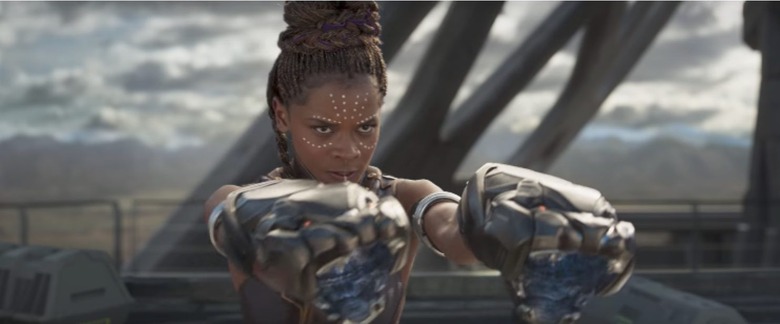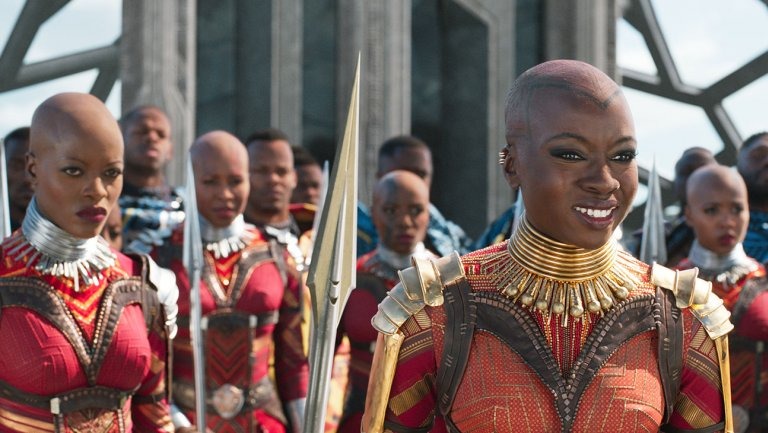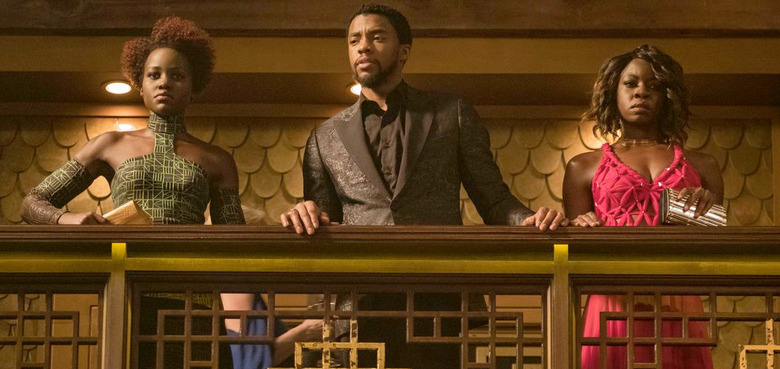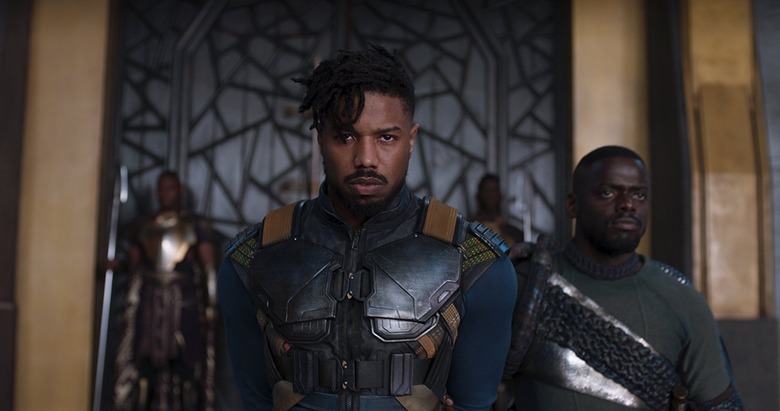'Black Panther' Reveals A Bright, Ambitious, And Personal Future For The Marvel Cinematic Universe
(Welcome to Road to Infinity War, a new series where we revisit the first 18 movies of the Marvel Cinematic Universe and ask "How did we get here?" In this edition: we reach our conclusion with Black Panther, a film that finds Marvel reaching its optimum.)
The final stop on the Road to Infinity War is Black Panther, a sprawling superhero epic the likes of which American cinema has never seen. It's still cleaning house at the global box office just days before its follow-up (a nine-franchise culmination to the Marvel saga), and it's one of the most important pieces of the Marvel puzzle. Not necessarily in terms of overall narrative – the film is relatively isolated from sixteen of its seventeen predecessors – but rather, as a potentially landscape-shifting benchmark for mainstream filmmaking.
While it's hard to measure a film's long-term legacy in just its third month of release, it's safe to assume that no American film since Marvel's own The Avengers has had this seismic an impact. Black Panther has flown past all critical and financial expectations (and then some), completing Marvel's third act turn of stepping outside the norms of Western storytelling – as seen in Doctor Strange, Guardians of the Galaxy Vol. 2 and Thor: Ragnarok – albeit to a much more significant degree. It builds on all the tricks of Marvel movies past, dipping its toes in the familiar before transforming the visual and thematic language of the superhero movie entirely. It's what happens when a studio places its trust in a creative team uniquely suited to the story, and it'll probably result in other studios taking similar risks on Black filmmakers and other filmmakers of colour, redefining who gets to hold the megaphone of mainstream cinema.
The long-held executive myth that black stars can't open big movies feels like it's all but gone, and who knows what other myths will crumble in the years to come.
Then again, some of these changes would likely be possible even if the film were a financial success but an artistic failure. The discussion of its full industry impact will likely be abstract until substantial changes actually come into view, but the reason it feels like we're just waiting for the cement to harden is the precision with which it was poured. The fact remains: the success and cultural importance of Black Panther is owed in large part to it being an absolute banger. It's pop filmmaking at its finest, filtered through a potent lens that's just been itching to be utilized.
Afrofuturism
In his 1994 essay "Black to the Future," cultural critic Mark Dery (in conversation with several prominent African American voices in sci-fi and criticism) coined the term "Afrofuturism." It's a creative philosophy that prioritizes stories, themes and aesthetics drawn from African influence – as opposed to simply having them be window dressing in Western science fiction – and the design of Black Panther is steeped in it. The film feels new to most Western eyes, and to most eyes in general, because it steps outside Hollywood's traditional depictions of African culture. It lets Black creators craft a Pan-African tapestry that speaks, first and foremost, to members of an African diaspora that may have been robbed of their languages and specific cultural origins.
This is owed in part to Marvel Studios letting director Ryan Coogler bring on creative heads familiar to him, each of whom worked their magic to bring a sense of grounded familiarity to the fantasy setting of Wakanda. Coogler was joined by several of his Creed and/or Fruitvale Station cohorts, like cinematographer Rachel Morrison (Mudbound, Dope), composer Ludwig Göransson (Survivors Remorse) and production designer Hannah Beachler (Moonlight, Lemonade), along with a who's who of other key creatives of Coogler's choosing, like writer Joe Robert Cole (The People vs O.J. Simpson) and legendary costume designer Ruth E. Carter (Selma, Malcolm X). That's a lot of talent on display, and more importantly, it's talent whose focus has been the telling of Black narratives.
In the process, Black Panther is imbued at every turn with a unique visual and aural authenticity, remixed to create something new. The costumes and accessories of Wakanda's various factions take their cues from real African cultures, like Suri for the River Tribe and Masai for the Mining Tribe, not to mention Ruth E. Carter's own Basotho for Border Tribe led by W'Kabi (Daniel Kaluuya). This African superpower, walled off from the effects of colonialism, saw technological innovation and African tribal art and symbolism progress as one and the same, as opposed to their usual portrayal as mutual exclusives. Apart from just the aesthetics though, Black Panther leans in to the core thematic purpose of Afrofuturism as well: exploring the world – past, present and potential future – through a lens of Blackness.
A Clash of Perspectives
Wakanda represents the best and worst of modern America. While its unfettered progress yields unapologetically Pan-African aesthetics, it stands locked in debate over the refugee crisis outside its borders. The recent change in leadership from the late King T'Chaka (John Kani, Atandwa Kani) to his son T'Challa (Chadwick Boseman) has left the kingdom in a state of mournful reflection. In Captain America: Civil War, the nation's attempts to open up to the world led indirectly deaths of its civilians in Lagos and directly to the murder of its monarch. "The world is changing" is the mantra of several Marvel characters from T'Chaka to The Vulture (Spider-Man: Homecoming), and the various factions within Wakanda are in disagreement over how to adapt to that change.
T'Challa is at the center of these warring ideals, a character figuring out the best course of action to balance being a good man with being an effective leader. Like "Phase 3" heroes Thor (Ragnarok) and Star-Lord (Guardians Vol. 2), he's shouldered with both a divine legacy and the lies told in order to maintain it; a rotten foundation that keeps the kingdom standing. In T'Challa's case, the lie was T'Chaka's murder of his own brother N'Jobu (Sterling K. Brown) and the subsequent abandonment of N'Jobu's son Erik (Michael B. Jordan) in order to keep Wakanda a secret. While Erik eventually returns to exact vengeance, T'Challa must not only consider Erik's outlook on Wakanda's refusal to provide aid, but the outlook of everyone around him.
T'Challa is the central point linking all of Wakanda's ideological conflicts, each articulated by a uniquely alluring character who comes off in the right in some form. It's on T'Challa to decide which parts of these conflicting ideas to consider before making his decisions. His responsibility is to compromise, and that's a tough position to be in.
A Stellar Ensemble
The clashing approaches to Wakanda's future are rooted in fun and likable characters, each of whom could just as easily get their own spin-off. T'Challa's sister Shuri (Letitia Wright), a young scientific inventor, is the nation's bright future. She cuts through Wakanda's stern regality with her meme and pop culture reference-laden levity – more specifically, references she picked up from western media. She represents both technological progress and the more globalist perspective of the current, connected youth, but she also turns her back on tradition in the process. Whether or not she intends it, progress for Shuri means shedding the garbs and ceremonies whose meaning she doesn't understand.
This doesn't sit well with M'baku (Wintston Duke), the leader of the mountainous Jabari tribe. Wakanda's forgotten people feel their identity is being trampled on, and M'baku calls T'Challa out for handing the kingdom's keys to "child who scoffs at tradition," before challenging him for the crown. Though when the time comes for the gentle giant to protect his kingdom, he's prepared to pledge his loyalty to T'Challa – not unlike Hanuman, the Hindu deity worshipped by his tribe. In the Hindu epic Ramayana, Hanuman was the ape-like devotee of Lord Rama and his brother Lakshmana, exiled princess who enlist the help of Hanuman's tribe to defeat an evil ruler. As the story goes, Hanuman lifts and retrieves an entire mountain full of sacred herbs to revive an injured Lakshmana.
The mountain-dwelling M'baku's role in Black Panther bears a striking resemblance to this story. He rescues the fallen prince T'Challa, now exiled from his kingdom, and revives him with the Heart-Shaped Herb (rather than keeping it for himself), before helping T'Challa reclaim the throne. What's more, M'baku's serious demeanor is undercut with playful humour, which not only makes him a joy to watch, but fits right in with the way Shuri interacts with T'Challa. One can't help get the feeling that M'baku and Shuri might be friends if they were able to come to an understanding.
T'Challa's ex Nakia (Lupita Nyong'o) wants to help the women of the surrounding African nations, but she's forced to do so in the shadows. She's a spy by nature, slipping out of Wakanda as quietly as she came, refusing to take up the throne alongside T'Challa if it means being unable to continue her missions. Like Shuri, she also turns her back on tradition. She refuses both the throne and the garb of the Dora Milaje (the Panther's Royal Guard) in order to embody what she believes is the right path for Wakanda. Though eventually, when T'Challa decides to incorporate her outlook on foreign aid into his ruling policy, she might have to decide to stick around and see things through on a larger scale.
After T'Challa is overthrown by Erik, Nakia clashes with Okoye (Danai Gurira), the fearsome head of the Dora Milaje, over how to serve their country going forward. This debate about loyalty is rooted not only in Nakia's lack of adherence to structure – a boon when she needs to act lone, but a bane when she's called upon to defend her kingdom – but Okoye's adherence to the throne to the point of rigidity. Defending Wakanda's throne is all she's ever known, but thus far, it's meant defending the family that controlled it. She has a friendly relationship with T'Challa, and would defend him to the death. But her idea of loyalty itself is challenged when T'Challa is apparently killed and she's forced to wrestle with serving Wakanda's new king, the man responsible for this death.
Nakia and Okoye's constant butting of heads brings up a pertinent question: what does loyalty mean in the context of a nation? Loyalty to its people, or to the structures they represent? When T'Challa makes the decision to save a wounded Everett Ross (Martin Freeman), who was shot in the spine protecting Nakia, Okoye opposes the bringing of an outsider into Wakanda. It's here that T'Challa makes his first concrete change as a leader, choosing to save Ross' life despite his role as an officer for the CIA, making him the most likely person to expose Wakanda's true nature to the world. The "Good leader" versus "Good man" tug-of-war made absolutely urgent.
Okoye even butts heads with her lover W'Kabi, T'Challa's best friend, over how to serve their new ruler and his militaristic intent. W'Kabi's parents were killed when an outsider (Andy Serkis' Ulysses Klaue) infiltrated their borders, so he's adamant about not letting refugees into Wakanda as they bring their problems with them. With W'Kabi in one ear and Nakia in the other, debating indirectly over how best to help outsiders (if at all), T'Challa doesn't fully know how to proceed. That is, until he sees the extreme effects of Wakanda's abandonment up close, in the form of Erik Killmonger.
N’Jadaka
Killmonger, T'Challa's American cousin, is Wakanda's forgotten son. His father N'Jobu wanted to use stolen Wakandan weapons to help oppressed African Americans rise up in Oakland – Ryan Coogler's hometown, and the city where the Black Panther Party was formed – but he was murdered by T'Chaka for his mutiny. This left Erik to grow up fatherless and on streets where death was a common occurrence, cast out by those who ought to have taken care of him. He returns to Wakanda to overthrow its king and to wage war on other nations, using the tools of U.S. military imperialism he was raised with in the CIA. In the process, he hopes to reverse the effects of colonialism by helping Black people worldwide murder their oppressors.
There is a conservative, paradoxical streak to Killmonger's politics (or rather, the way they're contextualized), just as there is to the Marvel Cinematic Universe at large. The conflation of militant liberation with violent imperialism is a strange mixed metaphor as the two are often at odds, though the film does make an effort to have other characters describe Killmonger's plan as the re-creation of imperialism itself. It doesn't quite work as intended, given that centuries of colonialism can't possibly be reserved overnight in any structural sense, and we never actually see what's at stake outside Wakanda's borders in the event that its sleeper agents are armed. But while the literal aspect to Killmonger is muddied a bit, Killmonger as an abstract is one of the most powerful elements Marvel has crafted till date, and he feels distinctly like a Ryan Coogler creation.
Right from the moment he's introduced, Killmonger has a point. He highlights the white lens of the preservation of stolen African artifacts, the kind of lens often employed in museums in the West, calling into question the idea of cultural ownership in a postcolonial climate. Though while he was cut off from his culture at large like most African Americans, his personal motivations are even more potent. He is defined by a moment of violence from his childhood. His walkabout in the ancestral plane is limited to the apartment where he found his father's body, and his spiritual vision sees him reduced to a child once more. He never had the love or guidance that T'Challa did. The lack thereof contributed to the environment that made him violent in turn, along with the U.S. military structures that took full advantage of his violence.
Whether or not the storytellers were willing, Black Panther was likely unable to approach the idea of violence with more nuance (the film is, after all, a product of a conglomerate unlikely to alienate a white customer base). The lethal violence of Killmonger, aimed at white oppressors, is contextualized as a wholesale wrong. Conversely, the narrative continually justifies T'Challa's lethal actions, like his freeing of Muslim women from what appears to be a disposable Boko Haram analogue – though Nakia does stop him from killing a young soldier who doesn't seem to know better. While there's certainly an iffy-ness to this dichotomy, Killmonger's motivations are still rooted in entirely in the concept of liberation. He's right, in that Wakanda should use its resources to help those in need, though it's eventually Nakia's more empathetic methods that are adopted by Wakanda's king.
Killmonger and T'Challa inherit their fathers' legacies, rooting Marvel's usually abstract paternal M.O. of mutual disappointment – General Ross, Howard Stark, Hank Pym, Odin, Ego, etc. – in discernible sociopolitical ethos. The lies T'Chaka told weren't just to keep a fictional kingdom a secret, they resulted in the refusal to help over-policed and over-incarcerated African Americans. More pertinently, they resulted in the realistic hardship of an orphaned Black child, as a punishment for his father's crimes.
In the end, it's this wrong that T'Challa needs to right most of all. It's why his decision to start outreach programs in Oakland feels meaningful, and it's why being approached by a young, awestruck Black boy, not unlike Killmonger all those years ago, is the perfect culmination. Ultimately, the film comes down on the side of foregoing the rigidity of borders and helping those in need, regardless of their origin. When was the last time a superhero movie did something like that?
T'Challa's father T'Chaka used his mantle to strip away a child's future. That child in turn tried to use the Black Panther as a tool of oppression. T'Challa on the other hand, uses the Black Panther to inspire, just like the film itself is likely to catalyze change and show young Black filmmakers what's possible. At their very best, that's what even massive corporate products like the Marvel Cinematic Universe can be, with the right artists behind them.
Inspiration.




